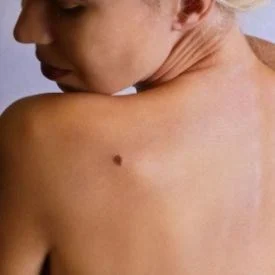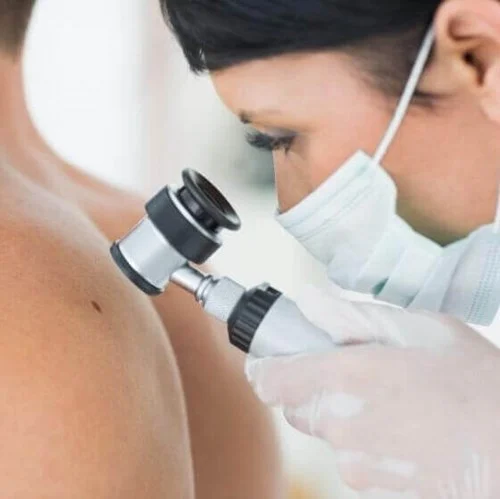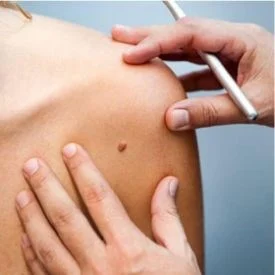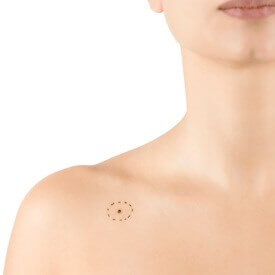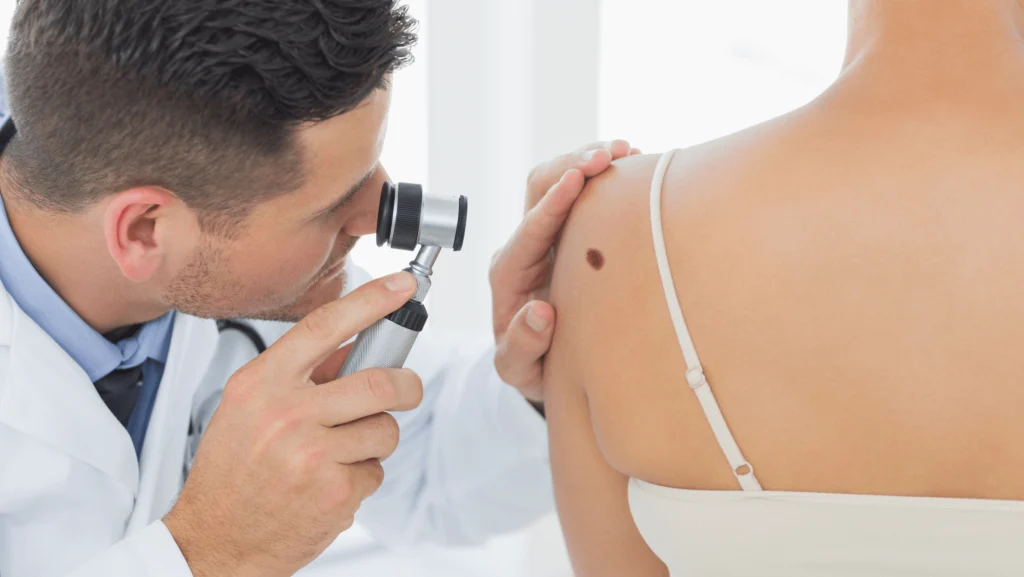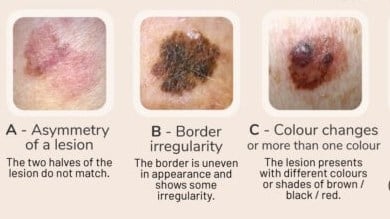What can be done to reduce the risk of developing more skin cancer if they have already had basal or squamous cell skin cancer?
Skin Cancer Screenings in Fort Washington, PA
ABOUT SKIN CANCER SCREENINGS
According to the Skin Cancer Foundation, one in five Americans will develop skin cancer in their lifetime. The high prevalence of skin cancer makes regular skin cancer screenings a must, especially if you have a personal or family history of skin cancer. Early detection is key to having more treatment options and better outcomes. Along with many advanced skin cancer treatments, the medical director of the Dermatology and Skin Cancer Institute, Dr. Aradhna Saxena, offers comprehensive skin cancer screenings and biopsies of abnormal areas. To schedule a skin cancer screening with us, contact one of our three offices in the Greater Philadelphia area.
TYPES OF SKIN CANCER
Dr. Saxena looks for four types of skin cancer during a skin cancer screening:
- Actinic Keratoses (AK): This type tends to form after the age of 40 and on areas of the skin that have been exposed to sun — such as the head, neck, hands, and forearms. AKs appear as dry, scaly patches and are commonly considered precancerous because they have the potential to develop into squamous cell carcinoma.
- Basal Cell Carcinoma (BCC): This is the most common type of skin cancer. BCC can form anywhere on the body and may appear as a pink area or as a flesh-colored or pearl-like bump. BCC needs to be treated because it has potential to grow into the nerves and bones, causing damage and disfigurement.
- Squamous Cell Carcinoma (SCC): This is the second most common form of skin cancer. Forming on skin that gets the most sun exposure, SCC appears as scaly patches; red, firm bumps; and/or sores that heal and reopen. These should be removed to prevent damage and disfigurement.
- Melanoma: This type of cancer develops suddenly as a dark spot on the skin. Dr. Saxena uses the ABCDEs to detect melanoma — Asymmetry, Border, Color, Diameter, and Evolving. According to the Skin Cancer Foundation, melanoma accounts for only one percent of skin cancer cases but for the majority of skin cancer deaths. For this reason, melanoma should be treated as soon as possible after it is diagnosed.
IDEAL CANDIDATES
Men, women, and children of all ages are at risk for skin cancer. While people with fairer complexions are at greater risk, all skin tones and types can get skin cancer. Dr. Saxena recommends every patient perform regular self-exams of their skin so they know what is normal and when a spot changes. You should schedule a skin exam any time you are concerned that a spot on your skin has changed or if it itches or bleeds. If you or a close relative has been diagnosed with skin cancer, you should make yearly appointments for skin cancer screenings.
PROCEDURE TECHNIQUE
During your skin cancer screening, Dr. Kasper will check your full body for birthmarks, moles, and any abnormal areas. Dr. Kasper can show you how to perform a self-exam between your appointments.
In some cases, Dr. Kasper may take a biopsy of a suspicious mole or spot. She will numb the area and then shave off a small sample. The biopsy will be sent to a pathology lab for analysis. When Dr. Kasper receives your pathology report, you will be contacted with the results.
WHAT TO EXPECT
After your exam, Dr. Kasper will talk to you about your results and any recommended actions. He will also let you know when you should return for your next skin cancer screening.
If you need a biopsy of an abnormal area, there is a potential for scarring. Dr. Kasper is able to minimize the appearance of scarring and takes the smallest skin sample possible during a biopsy. Dr. Kasper will go over the best way to care for your skin after the biopsy to help your skin heal correctly. With good care, any scarring should be flat and fade so it is barely visible.
FREQUENTLY ASKED QUESTIONS
How are the ABCDEs of skin cancer identified?
The ABCDEs of skin cancer include Asymmetry, Border, Color, Diameter, and Evolving. Cancerous moles may have an irregular shape, jagged or blurred borders, and non-uniform color, with different shades of black, brown, or tan. Additionally, they are often more than six millimeters in diameter.
When should I receive a skin cancer screening?
Everyone should receive a skin cancer screening annually or bi-annually, but you may also need a screening if you notice any changes or abnormalities in lesions or moles. Early detection is key to successful treatment, so it is important that you seek the appropriate care at the first sign of irregularity. If you are unsure if a mole or lesion may be cancerous, it is better to go ahead and schedule a screening just to be sure.
When is a biopsy necessary?
During the first step of a skin cancer screening, we will closely review any part of the skin that appears abnormal. If something looks like it might be cancerous, then a biopsy will be taken. The biopsy is the step that confirms or whether or not cancer exists. Very few cancers are definitively diagnosed by simply looking at them.
If skin cancer is identified, what is the next step in treatment?
Cancer screenings and biopsies are the first steps to finding skin cancer early. If found, removal of all the cancer cells is the best way to reduce the chance of the cancer spreading. Our practice works with patients on screenings, biopsies, diagnosis, and treatments. Dr. Saxena is a fellowship-trained Mohs surgeon and is very experienced in the removal of all types of skin cancer. She can provide post-removal reconstructive surgery as well.
EARLY DETECTION IS THE KEY
Understanding your risk and early detection are two important keys to the successful treatment of skin cancer. If you are due for a regular skin cancer screening or have noticed a suspicious change in your skin, please contact one of our offices in Fort Washington, Lansdale, or Willow Grove, PA. Dr. Saxena is a board-certified dermatologist, fellowship-trained Mohs surgeon, and skin cancer specialist who can diagnose and treat you properly — or set your mind at ease.


